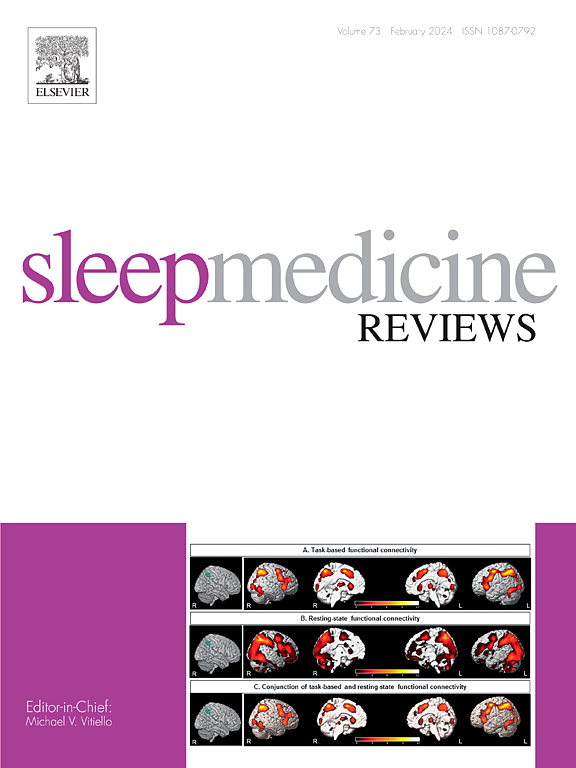The effects of mandibular advancement devices on pediatric obstructive sleep apnea: An umbrella review
IF 9.7
1区 医学
Q1 CLINICAL NEUROLOGY
引用次数: 0
Abstract
This umbrella review evaluated the effects of mandibular advancement devices (MADs) on pediatric obstructive sleep apnea (PedOSA). We searched six databases for systematic reviews published up to June 2025, that included children with polysomnography (PSG)-diagnosed OSA managed with MADs. The primary outcome was the change in the apnea-hypopnea index (AHI). Secondary outcomes included oxygen saturation and skeletal/dental changes. Twelve systematic reviews, including 7 meta-analyses, were included. Management with MADs resulted in a reduction in AHI and a slight improvement in sagittal mandibular position. However, significant heterogeneity was observed due to variations in device designs, treatment duration, and patient characteristics. Most findings were based on before-after studies, with limited randomized controlled trials, reducing the robustness of the results. The methodological quality of the included systematic reviews, assessed using AMSTAR 2, was predominantly low or critically low, indicating significant flaws. A corrected covered area (CCA) analysis revealed substantial overlap (20.7 %) in primary studies. While MADs show promise as an adjunctive therapy for PedOSA management in indicated cases, the low methodological quality of the included systematic reviews limits the strength of the evidence. High-quality primary studies and systematic reviews are needed to confirm the impact of MADs in PedOSA management and guide clinical practice.
下颌推进装置对儿童阻塞性睡眠呼吸暂停的影响:综述
本综述评估了下颌推进装置(MADs)对儿童阻塞性睡眠呼吸暂停(PedOSA)的影响。我们检索了截至2025年6月发表的6个数据库的系统综述,其中包括患有多导睡眠图(PSG)诊断的OSA并使用MADs治疗的儿童。主要终点是呼吸暂停低通气指数(AHI)的变化。次要结局包括血氧饱和度和骨骼/牙齿变化。纳入了12项系统综述,包括7项荟萃分析。MADs治疗导致AHI的降低和矢状下颌位置的轻微改善。然而,由于器械设计、治疗时间和患者特征的差异,观察到显著的异质性。大多数研究结果是基于前后对照研究,随机对照试验有限,降低了结果的稳健性。使用AMSTAR 2评估纳入的系统评价的方法学质量主要为低或极低,表明存在重大缺陷。经过校正的覆盖面积(CCA)分析显示,在主要研究中存在大量重叠(20.7%)。虽然MADs有望在指示病例中作为PedOSA管理的辅助疗法,但所纳入的系统评价的低方法学质量限制了证据的强度。需要高质量的初步研究和系统评价来证实MADs对PedOSA管理的影响并指导临床实践。
本文章由计算机程序翻译,如有差异,请以英文原文为准。
求助全文
约1分钟内获得全文
求助全文
来源期刊

Sleep Medicine Reviews
医学-临床神经学
CiteScore
20.10
自引率
3.80%
发文量
107
期刊介绍:
Sleep Medicine Reviews offers global coverage of sleep disorders, exploring their origins, diagnosis, treatment, and implications for related conditions at both individual and public health levels.
Articles comprehensively review clinical information from peer-reviewed journals across various disciplines in sleep medicine, encompassing pulmonology, psychiatry, psychology, physiology, otolaryngology, pediatrics, geriatrics, cardiology, dentistry, nursing, neurology, and general medicine.
The journal features narrative reviews, systematic reviews, and editorials addressing areas of controversy, debate, and future research within the field.
 求助内容:
求助内容: 应助结果提醒方式:
应助结果提醒方式:


